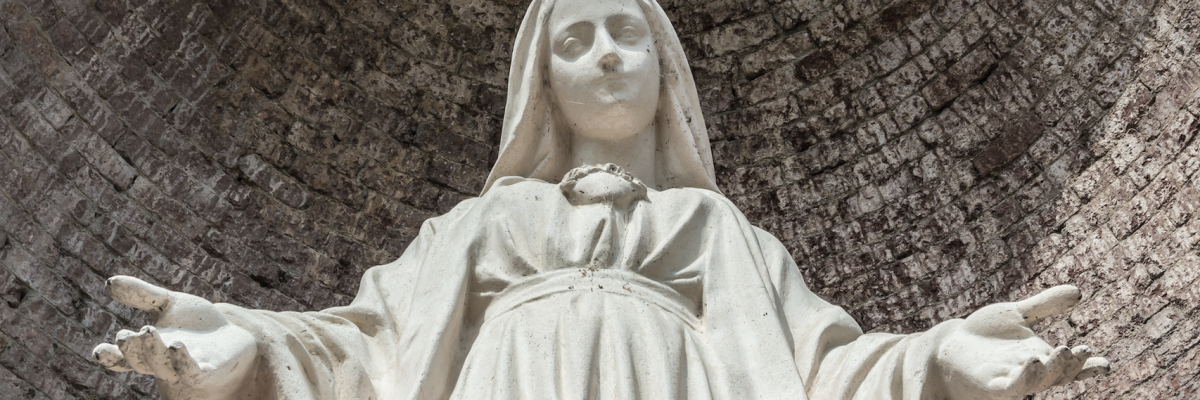
One hundred years ago, the Virgin Mary appeared to three shepherd children in six visitations near Fatima, Portugal. She sealed those visitations with a miracle of the sun, which danced and emitted colored rays of light before tens of thousands of eyewitnesses, a fitting maternal signature upon what the Vatican has recognized as “the most prophetic of modern apparitions” (The Message of Fatima).
Mary’s message to the three young visionaries did not consist merely of information: it was a call to action. The apparitions at Fatima were, above all, a call to penance. Fr. John Hardon affirms, “Our Lady of Fatima’s message to a sinful world in our day, may be summarized in the . . . imperative, ‘Do penance'” (Penance and Reparation). The imperative nature of this message was made apparent in the third part of the secret where St. Lucia records “the angel [crying] out in a loud voice: ‘Penance, penance, penance.’”
With penance at the core of our Lady’s message at Fatima, it is essential that we understand it.
What is penance?
In his book In The Beginning: A Catholic Understanding of Creation and The Fall, Pope Benedict XVI recalls a fellow bishop suggesting that the Lord’s call to repentance had become almost taboo among Christians. The bishop said, “We had long ago actually halved Jesus’ message [to repent and believe in the gospel] as it is thus summarized.” Christian preaching had become “like the recording of a symphony that was missing the initial bars of music, so that the whole symphony was incomplete and its development incomprehensible.”
Sin causes a rupture in our communion with God and a loss of grace. To heal that rupture we must act. We must first acknowledge our sinfulness and then sincerely resolve to turn from sin. Finally, we must make reparation and strive to repair what our sin damaged in ourselves and in the world. Thus penance is an action inspired by our love of God that expresses our desire to undo the disorder our sins brought into the world.
But why subject ourselves to pain that Christ already endured?
Our Lady of Fatima’s call to penance is above all a motherly plan of protection. As Pope John Paul II has assured us, “The insistent invitation of Mary Most Holy to penance is nothing but the manifestation of her maternal concern for the fate of the human family, in need of conversion and forgiveness” (Message for the 1997 World Day of the Sick). The purpose of penance is not punishment or suffering. Rather through suffering it is both reparative and preventive.
But penance, some people claim, is contrary to the Christian gospel, because Jesus suffered and died once for all “so we wouldn’t have to.” In part, this is true. Jesus’s atonement was all-sufficient for the world’s redemption. But there is nothing in the Bible that indicates we are exempt from suffering in this life. In fact, an anti-suffering gospel would not be “good news” at all, because it would be contrary to love.
According to Jesus, there is no greater love than to lay down one’s life for a friend (John 15:13). Thus, suffering and love go hand in hand. Indeed, an anti-suffering movement could lead only to despair. C.S. Lewis observed, “If you think of this world as a place simply intended for our happiness, you find it quite intolerable: think of it as a place for training and correction and it’s not so bad” (Answers to Questions on Christianity).
Thankfully, when it comes to penance we are not left to fend for ourselves. As members of the Body of Christ we can unite our sufferings mystically with Christ and his Church. “If one member suffers, all suffer together; if one member is honored, all rejoice together,” writes St. Paul (1 Cor. 12:26). For sure, Christ’s atonement is enough to blot out all sin and its consequences; but we have been invited to participate in Christ’s atoning act in order to “complete what is lacking in Christ’s afflictions for the sake of his body” (Col. 1:24).
The sacrament of penance
Mary’s message at Fatima included a summons to what are known as “First Saturday devotions” for reparation and world peace. A key component of this devotion is the confession of one’s sins in the sacrament of penance. For the Catholic, penance can take two forms: sacramental and non-sacramental. Both are powerful means of intercession.
The sacrament of penance (normally referred to as reconciliation or confession) is central to the Church’s mission of sanctifying its members. The resurrected Christ conferred this priestly “ministry of reconciliation” on the apostles: “Receive the Holy Spirit.If you forgive the sins of any, they are forgiven; if you retain the sins of any, they are retained” (John 20:21-23). As with all the sacraments Christ instituted, the sacrament of penance functions only by God’s grace.
Confessing one’s sins to a priest is an extraordinarily efficacious act of penance. The sacrament of penance serves as the gateway to our Lord in the Eucharist for the baptized sinner. With the absolution of the priest, who confers forgiveness “in the presence of Christ,” the sinner is made new (2 Cor. 5:18). Chesterton, who entered the Catholic Church “to get rid of [his] sins,” describes in his Autobiography the new life experienced by a freshly reconciled disciple of Christ:
He is now a new experiment of the Creator. He is as much a new experiment as he was when he was really only five years old. He stands, as I said, in the white light at the worthy beginning of the life of a man. The accumulations of time can no longer terrify. He may be grey and gouty; but he is only five minutes old.
A message of hope
Mary’s message at Fatima is, above all, one of hope. The glorious miracle of the sun was, I suppose it could be said, a powerful reminder of the glory of Mary’s resurrected Son; for by him alone is our final release from all pain made possible. Only in the light of Christ does suffering make sense; apart from the infinite merits of Christ, suffering is grim and fruitless. It would be a mistake to understand Mary’s call to penance at Fatima as bad news. Rather it was a new emphasis on the good news.
Our Lady of Fatima’s words are the maternal echo of her Son’s message in the Gospels: hope, magnified by the divine promise, “Behold, I am making all things new” (Rev. 21:5). For the Christian, therefore, no suffering is in vain. On Earth we are a suffering Church, and through our hopeful suffering we are “a signpost for man in his search for God” (The Message of Fatima).



